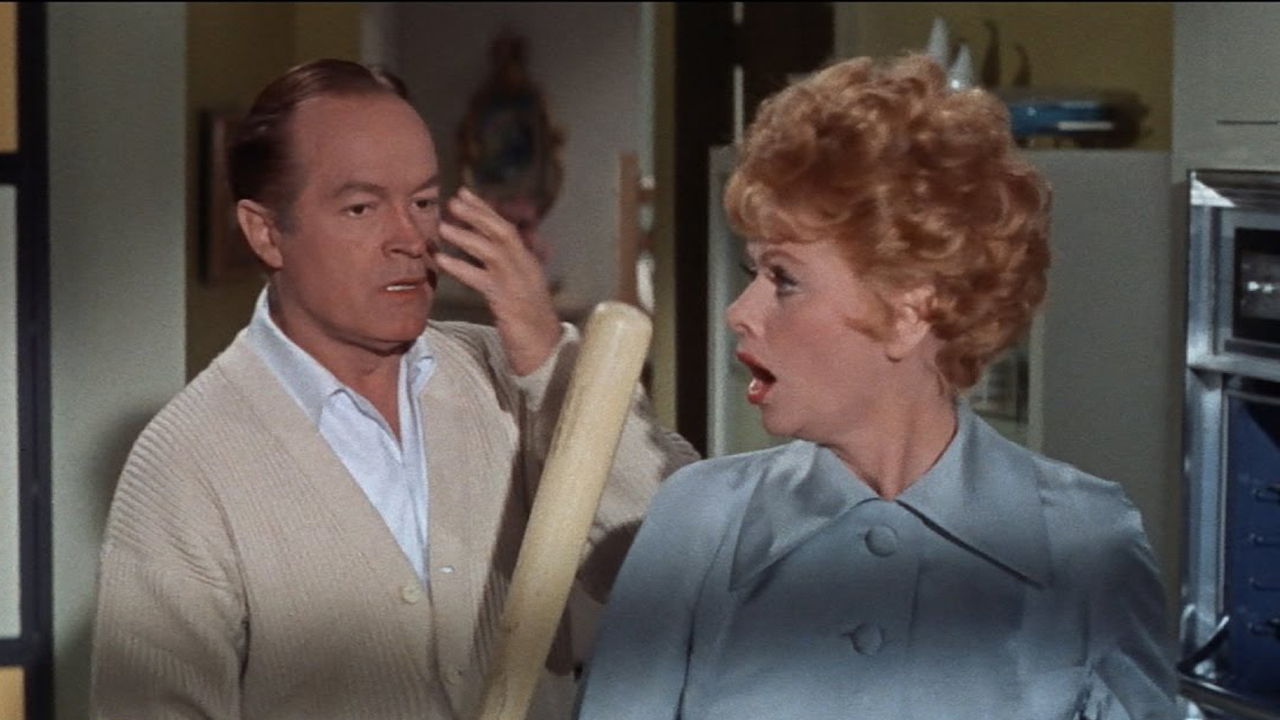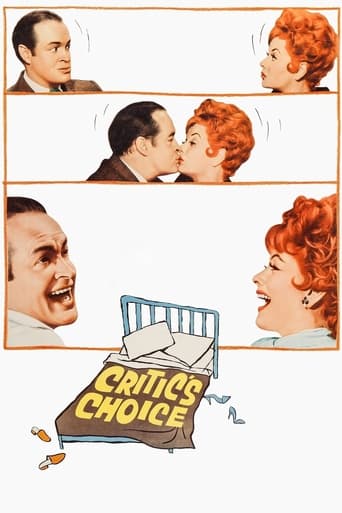

The greatest movie ever!
... View MoreI like Black Panther, but I didn't like this movie.
... View MoreA waste of 90 minutes of my life
... View MoreThis is a small, humorous movie in some ways, but it has a huge heart. What a nice experience.
... View MoreSomewhere along the line, someone (perhaps himself) told Bob Hope that he needed to change his screen persona. Instead of being a bit of a bungler at life and love -- which was very likable -- he tried to become more suave and sophisticated. Mostly, in my view, that didn't turn out too well. In fact, despite another 8 films before his film career ended, this was the last that I felt was good...and I mean darned good. So why does it tend to often get poor reviews? Very simple. While there is humor in it, this film is really a drama (with the exception of the drunk escapade, where it -- unfortunately -- becomes slapstick). And that's not what most people expect from Bob Hope or Lucille Ball. Nevertheless, Hope could be quite good at drama (e.g., "The Seven Little Foys" and "Beau James")...and is darned good here. And Lucy wasn't really a comedienne, but rather a comedic actress...there's a big difference between the two. And here she does very nicely in what is pretty much a dramatic role.As I said, there is some humor here, but it's mostly a fairly dramatic story line about the wife of a critic who writes a play. Will it be good or bad? Will he or won't he review it? And if he does, what will be the consequences? Marilyn Maxwell has a part as Hope's ex-wife (incidentally, you might want to Google Marilyn Maxwell + Bob Hope). I kept trying to figure out who the director in the film was...not quite recognizable...turned out to be a very young Rip Torn...and he was appropriately slightly sleazy...and actually quite funny. Jessie Royce Landis was always a welcome addition to any film...and usually as the mother-in-law. John Dehner was good as a Broadway producer. And it was nice to see Jim Backus as a psychiatrist! Child actor Ricky Kelman did a great job, here! At least nowadays, it's pretty clear why this film gets some negative reviews. It's very sexist. The husband/critic constantly puts his wife down for her work on writing a play; he then savages the play in a review; and then puts her in her place -- bed, after which he reviews their love-making. Unfortunately, Bob didn't realize the times were changing.It's a mixed bag with some very good acting.
... View MoreThe decor alone is worth the price -- I want to live in Hope and Ball's apartment!Maybe it's because I saw it at such a young age, but it's always been a favorite of mine. Good dialogue, great cast, and just a lot of fun. (Years later I worked with Soupy Sales and told him how much I'd liked his cameo as a desk clerk. He told me that he'd had no idea he was going to do the movie until he got a call from Hope the morning of the shoot asking him, "Wanna come out to Burbank today and do bit with me?")And to those reviewers who complain that Hope's character "walks out" on the show he's reviewing at the top of the film, there were no such things then as "critic's previews." Nowadays critics attend a production during the final week or two of previews and write their reviews at leisure, to be published the day after the official opening night.Back then, all the critics attended on opening night, and it was standard operating procedure to leave the theater in time to make it back to the paper to file the review before the deadline. It's not meant to imply that the character doesn't take his job seriously or is a "bad critic" as others have written. The only thing that's inaccurate about that part of the film is that in reality, ALL the other drama critics from ALL the other daily papers would have been "walking out" at the exact same moment to make the exact same deadline.
... View MoreI find the negative views of this film baffling. I saw it as a kid when it first opened, and have seen it many times since. It's one of my favorite Bob Hope films, and one of my favorite Lucille Ball films - primarily because both of these fine actors are given deeper roles than usual. The quips and comedic shenanigans are there, but rooted in realistic characters and credible motivations. Which only makes them funnier. This is a film that works as drama first, then finds the comedic possibilities.I also appreciate this as one of the very few good films *about* writing. The various phases that Lucy goes through in 'finding her muse' are true to life, and even somewhat inspiring. The reaction of others - especially critic-husband Hope's subtle jealousy - will be familiar to anyone who's ever tried to do creative work.But most of all, I love this film because it is often screamingly funny. Some of the dialog with Hope's ex-wife is very sharp. One of my favorite lines in any movie comes from Hope, after breaking the mainspring of his watch: "Symbolism. I cannot stand symbolism!" Hope spends almost the latter third of the film roaring drunk, delivering some of his best schtick. His scene in the theater balcony almost made me wet myself when I first saw it, and remains a classic slapstick moment. Again, all the funnier because it happens in such a believable context. (As Charlie Chaplin pointed out, when a clown takes a pratfall, it's not nearly as funny as when a pompous stuffed-shirt does it.)If you haven't seen this film, keep an eye out for it; you've got a real treat in store. And if you have seen it but haven't enjoyed it... No, I'm sorry: I have no advice for you. You're too far gone.
... View MoreIra Levin's play Critic's Choice which ran 189 performances on Broadway in the 1960-1961 season was expanded exponentially for the screen version. It's Broadway origins are hardly noticeable.Stepping into the roles played on stage by Henry Fonda and Georgeann Johnson are Bob Hope and Lucille Ball in their fourth and last film together. The more traditional Hope and traditional Lucy are to be found in their earlier films Sorrowful Jones and Fancy Pants. Still Critic's Choice works a whole lot better for them than The Facts of Life.Bob Hope is a theater critic and he's got a son by his first marriage to Marilyn Maxwell, Ricky Kelman. He's married now to Lucille Ball and Lucy's taken it in her head to write a play about her family life growing up with two sisters, Marie Windsor and Joan Shawlee, and her mother Jessie Royce-Landis. Hope fluffs the idea off, but this only makes Lucy more determined especially when she's working with director Rip Torn and producer John Dehner.There are a ton of characters not in the original play which took place in the Hope/Ball apartment. The addition of a lot of these people allowed Hope and Lucy to engage in some of their traditional comedy which they didn't do in The Facts of Life and paid dearly for it.This has to be the only film I know where the 'other' woman is the first wife. Marilyn Maxwell who it was reputed Hope was involved with around 1950 and who appeared in The Lemon Drop Kid with him, sees her chance back with him as Rip Torn starts to get interested in Lucy.Bob and Lucy get good support from a well chosen cast of familiar faces and Critic's Choice should please their fans.
... View More